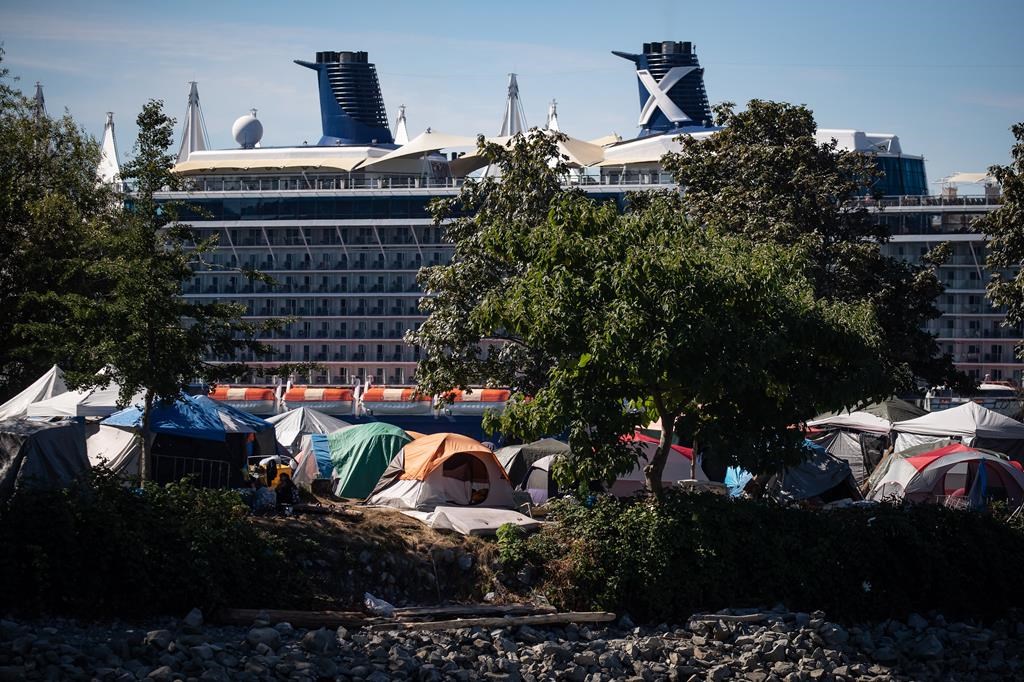A new report by Vancouver community activists is warning of a major surge in homelessness by the end of the decade without a significant infusion of housing cash from senior levels of government.

Titled ‘This Isn’t Working,” the report by the Carnegie Housing Project projects Vancouver’s homeless population could climb from about 3,150 today to more than 4,700 by 2030 due to pressures on existing units affordable to the city’s lowest-income residents.
“Whenever a whole building is cleared out for renovicction and there is no housing for people to go to, that’s where you end up with another tent city,” report co-author Devin O’Leary said Tuesday.

Organizers drew that figure from an estimated loss of 630 SRO units due to fire or maintenance neglect, another 1,300 from “massive” rent increases at SRO unit turnover, and the looming end of leases on about 860 modular housing units on city land.
“In that period of time the government is only planning about 1,250 new shelter-rate units to be built, so you can see the gap in the actual need,” O’Leary said.
One of the group’s key concerns is the future of “temporary” modular housing projects on city land, some of which have been in place for nearly a decade.
Housing project member Phoenix Winter said more than 140 such units were currently in storage, while leases for most of the remaining stock are expected to end in 2028.
“Unlike an SRO they have a kitchenette, they have their own bathroom, so they are self-contained units where people can live in decent housing and more safety,” she said.
“There are so many homeless people … and we need the units to be used.”

The group has issued dozens of recommendations, including a call for the province to implement “vacancy controls,” a measure that would restrict the maximum allowable rent increase when a unit turns over. The City of Vancouver attempted to implement vacancy controls for SROs in 2022, but the initiative was struck down by the courts.
The group is also calling for funding to renovate several vacant SROs including the Regent and Balmoral hotels, the addition of 1,000 more shelter spaces and the construction of a tiny home village next to CRAB Park.
Advocates say they want the definition of social housing changed as well so that 30 per cent of units in any designated building are held at the shelter rate of $500 per month.
Former Vancouver city councillor Jean Swanson said the federal government needs to start spending on social housing on a scale similar to the 1970s.
“The feds have to get back into housing. They have to start funding it like they used to,” she said.
“In the old days… low-income people could afford social housing. Now, these days, they cannot.”
The federal government has unveiled a suite of housing measures over the last year, including its $4 billion housing accelerator fund aimed at speeding up new home construction.
On Tuesday, Housing Minister Sean Fraser announced another $123 million to build about 5,600 new affordable homes along with rent-to-own initiatives and Indigenous-oriented housing with wrap-around services.

“This is a really exciting opportunity from my perspective not just because we’re going to build 5,600 homes, but because we’re going to be able to identify whether and to what extent these solutions have a broader application that will allow us to scale over time,” Fraser said.
Swanson argued that the majority of federal housing programs are aimed at middle-income housing, rather than for purchasing properties or subsidizing rent for the region’s most vulnerable.
B.C. Housing Minister Ravi Kahlon said the province was currently reviewing the court decision blocking vacancy controls at SROs.
But he said the province’s vision aims to stop relying the micro units that currently provide the bulk of the region’s cheapest housing.
“What’s needed is a long-term plan that moves away from SROs. They are a major challenge, many of them are unlivable, and that’s what we’ve been advocating to the federal government,” he said.
“It’s not something that’s going to be done overnight.”
The province, he added, was currently working with the City of Vancouver on options to potentially extend leases or find new sites for its aging modular housing stock.

In a statement, the City of Vancouver said that there were no new modular housing projects in the works, with the projects “always intended to be temporary.”
Many sites with expiring leases, it said, are on land currently slated for redevelopment.
“When a lease of a City site approaches expiry and the license cannot be extended due to pending redevelopment of the site or by-law limitations, BC Housing, and the operator work together to relocate residents to other affordable supportive homes,” the city said.
“In the event a City site is not ready for permanent development, the City works with the partners to find a suitable lease extension period.”
The Carnegie Housing Project said that work won’t be enough to keep people sheltered before next winter and that significant funding commitments are needed to protect the most vulnerable.
“Some people might say that it’s not their responsibility — we’re here to say it is,” advocate Max Harper Campbell said.
“Affordable housing needs to be affordable for poor people. Provincial and federal governments need to step up and make it happen.”




Comments